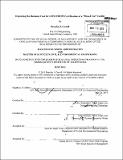Exploring the business case for LEED EBOM certification of a "Mixed Use" facility
Author(s)
Carroll, Brendan J., S.M. (Brendan Joseph). Massachusetts Institute of Technology
DownloadFull printable version (3.559Mb)
Alternative title
Exploring the Business Case for Leadership in Energy and Environmental Design Existing Buildings: Operations and Maintenance certification of a "Mixed Use" Facility
Other Contributors
Leaders for Global Operations Program.
Advisor
John A Ochsendorf and John Sterman.
Terms of use
Metadata
Show full item recordAbstract
Many buildings are highly inefficient in terms of energy and water use and lack features important to a productive and healthy work environment. While many companies have established sustainability goals to ensure new buildings conform to "green standards," these same companies fail to realize the commercial, environmental, and social benefits from improving existing buildings. Here we examine the benefits of and barriers to greening existing buildings at Raytheon Space and Airborne Systems (SAS) in El Segundo, CA. We use the Leadership in Energy and Environmental Design (LEED) Existing Buildings: Operations and Maintenance (EBOM) framework to explore the business case for pursuing LEED EBOM certification. Because some of the buildings in this study are "mixed use," meaning they house multiple space types within the same building envelope, we must first determine if the LEED framework applies. After benchmarking the energy and water efficiency of each building, we use interviews, surveys, and audits to discover the applicable benefits of greening these buildings. Furthermore, we explore whether companies can realize these benefits with more optimal methods versus pursuing LEED certification. Additionally, the barriers to greening existing buildings are discussed to discover why some companies fail to take advantage of immense savings opportunities. Key results are that companies can realize significant financial savings opportunities by first conducting water and energy audits and then by implementing no to low cost efficiency projects. While LEED certification is not necessary to realize financial and environmental benefits, the recognition LEED certification provides allows companies to realize "soft benefits." These benefits consist of certification's attractiveness to customers, its benefit to brand image, and its ability to attract and retain talent. Common barriers include acceptance issues, business financing practices, and possessing the capacity to implement projects. We conclude there is a business case for the Raytheon SAS to pursue LEED EBOM certification as a pilot project to validate the benefits of LEED.
Description
Thesis (M.B.A.)--Massachusetts Institute of Technology, Sloan School of Management; and, (S.M.)--Massachusetts Institute of Technology, Dept. of Civil and Environmental Engineering; in conjunction with the Leaders for Global Operations Program at MIT, 2013. Cataloged from PDF version of thesis. Includes bibliographical references (p. 40-41).
Date issued
2013Department
Leaders for Global Operations Program at MIT; Massachusetts Institute of Technology. Department of Civil and Environmental Engineering; Sloan School of ManagementPublisher
Massachusetts Institute of Technology
Keywords
Sloan School of Management., Civil and Environmental Engineering., Leaders for Global Operations Program.